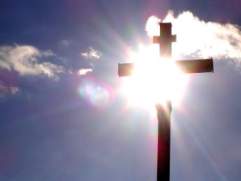Please read the following verses. Do not skip over them.
“But you will receive power when the Holy Spirit has come upon you, and you will be my witnesses in Jerusalem and in all Judea and Samaria, and to the end of the earth.”
—Acts 1:8“‘And in the last days it shall be, God declares, that I will pour out my Spirit on all flesh, and your sons and your daughters shall prophesy, and your young men shall see visions, and your old men shall dream dreams; even on my male servants and female servants in those days I will pour out my Spirit, and they shall prophesy. And I will show wonders in the heavens above and signs on the earth below, blood, and fire, and vapor of smoke; the sun shall be turned to darkness and the moon to blood, before the day of the Lord comes, the great and magnificent day. And it shall come to pass that everyone who calls upon the name of the Lord shall be saved.'”
—Acts 2:17-21And Stephen, full of grace and power, was doing great wonders and signs among the people.
—Acts 6:8For I will not venture to speak of anything except what Christ has accomplished through me to bring the Gentiles to obedience–by word and deed, by the power of signs and wonders, by the power of the Spirit of God–so that from Jerusalem and all the way around to Illyricum I have fulfilled the ministry of the gospel of Christ….
—Romans 15:18-19And I, when I came to you, brothers, did not come proclaiming to you the testimony of God with lofty speech or wisdom. For I decided to know nothing among you except Jesus Christ and him crucified. And I was with you in weakness and in fear and much trembling, and my speech and my message were not in plausible words of wisdom, but in demonstration of the Spirit and of power, that your faith might not rest in the wisdom of men but in the power of God.
—1 Corinthians 2:1-5For the kingdom of God does not consist in talk but in power.
—1 Corinthians 4:20For the weapons of our warfare are not of the flesh but have divine power to destroy strongholds.
—2 Corinthians 10:4…for God gave us a spirit not of fear but of power and love and self-control.
—2 Timothy 1:7Therefore, confess your sins to one another and pray for one another, that you may be healed. The prayer of a righteous person has great power as it is working.
—James 5:16For since the message declared by angels proved to be reliable, and every transgression or disobedience received a just retribution, how shall we escape if we neglect such a great salvation? It was declared at first by the Lord, and it was attested to us by those who heard, while God also bore witness by signs and wonders and various miracles and by gifts of the Holy Spirit distributed according to his will.
—Hebrews 2:2-4But understand this, that in the last days there will come times of difficulty. For people will be lovers of self, lovers of money, proud, arrogant, abusive, disobedient to their parents, ungrateful, unholy, heartless, unappeasable, slanderous, without self-control, brutal, not loving good, treacherous, reckless, swollen with conceit, lovers of pleasure rather than lovers of God, having the appearance of godliness, but denying its power. Avoid such people.
—2 Timothy 3:1-5
Thank you for reading those verses. I pray that they blessed you.
My son and I have been reading through Acts together. What continues to strike me about the Church was the power that operated through it. Healings, resurrections, miracles—they are part and parcel of what defined the Church and what made it a threat to those who opposed it.
Today, my son and I read how the Holy Spirit instructed a normal Christian named Ananias to go to a certain street, to a certain house, to lay hands on a certain persecutor of the Church, so that man might receive his sight again and be filled with the Holy Spirit.
I read that true account with awe. Sadly, that awe had more to do with the disbelief I see among so many who call themselves Christians but who readily dismiss anything miraculous in the Christian life. Theirs is a weakened, powerless Gospel.
I’m tired of reading blogs that tell me what a weak sinner I am but fail to tell me what a Spirit-empowered saint Christ has made me because I am a new creation who sits with Christ in the heavenly places.
I’m tired of hearing people who say that all “that stuff” has passed away when the Bible tells me that I will receive power to be Christ’s witness to the ends of the earth, noting that the “ends of the earth” are still unreached in some places today. Those same people blithely ignore that the prophecy of Joel of the Last Days, filled as they were with signs and wonders, was to persist till the Great Day of the Lord.
I don’t get how people can leave out that the Bible teaches that the Gospel is accompanied by power, by signs and wonders, that these things attest to its truthfulness.
I don’t understand how people can read the Bible and come away thinking that raising the dead is just a figurative spiritual expression. Or how people can turn off God’s voice so that He can’t give specific instructions to Christians to do this or that in ways that can’t be gleaned from the pages of Scripture. So that Ananias does not know where to go to find Paul or that he should even lay hands on anyone in the first place. Or that Philip never hears from God to go over to that specific chariot and speak to that specific eunuch.
I’m sick and tired of a Church that walks away from its birthright of power because it is afraid, badly taught, foolish, or deceived.
You can’t read the Bible and not believe in the kind of power we see demonstrated so readily in the Church in the Book of Acts. You just can’t.
“No one ever just picked up the Bible, started reading, and then came to the conclusion that God was not doing signs and wonders anymore and that the gifts of the Holy Spirit had passed away … If you were to lock a brand new Christian in a room with a Bible and tell him to study what the Scriptures have to say about healing and miracles, he would never come out of the room a cessationist … The doctrine of cessationism did not originate from a careful study of the scriptures … [but] … originated in experience.”
– Jack Deere, former cessationist
And what is the experience Deere speaks of ?
[Jesus] went away from there and came to his hometown, and his disciples followed him. And on the Sabbath he began to teach in the synagogue, and many who heard him were astonished, saying, “Where did this man get these things? What is the wisdom given to him? How are such mighty works done by his hands? Is not this the carpenter, the son of Mary and brother of James and Joses and Judas and Simon? And are not his sisters here with us?” And they took offense at him. And Jesus said to them, “A prophet is not without honor, except in his hometown and among his relatives and in his own household.” And he could do no mighty work there, except that he laid his hands on a few sick people and healed them. And he marveled because of their unbelief.
—Mark 6:1-6a
It is the same unbelief we see in the pious people who told a certain blind man to be content in his blindness and suffering:
As [Jesus] drew near to Jericho, a blind man was sitting by the roadside begging. And hearing a crowd going by, he inquired what this meant. They told him, “Jesus of Nazareth is passing by.” And he cried out, “Jesus, Son of David, have mercy on me!” And those who were in front rebuked him, telling him to be silent. But he cried out all the more, “Son of David, have mercy on me!” And Jesus stopped and commanded him to be brought to him. And when he came near, he asked him, “What do you want me to do for you?” He said, “Lord, let me recover my sight.” And Jesus said to him, “Recover your sight; your faith has made you well.” And immediately he recovered his sight and followed him, glorifying God. And all the people, when they saw it, gave praise to God.
—Luke 18:35-43
It is the experience of rationalization and excuses, of misplaced familiarity, simple unbelief, and faithlessness.
It is the kind of mentality that Paul warns of when he talks about people who have a form of godliness but deny its power. Certainly the people of Jesus’ hometown attended their synagogue and seemed pious. They had a form of godliness. The only problem was that they denied its power. And the mighty works were diminished, even at the hand of the Lord, because of their dismissive unbelief.
Those dismissive people anger me. And they are everywhere in the Western Church, a Western Church born of the Enlightenment that denies anything and everything supernatual.
On my wall is a picture of a missionary. His name is Rachapalli, and he labors in India, his homeland. He is a Christian today because a pastor came to his home and laid hands on Rachapalli’s paralyzed father and did what all the witchdoctors could not do: healed him by the power of God. The words of God were confirmed to that family because of this healing, and they gave their lives to Christ.
The Gospel is going forth in power in nations that are not ours because those people in those nations still believe. We, however, have our best Bible teachers telling us that all that stuff passed away.
This explains much about the destitution in the American Church.
What about you? Do you believe the Bible? Or do you believe people who have a form of godliness but deny its power?
And when the men had come to [Jesus], they said, “John the Baptist has sent us to you, saying, ‘Are you the one who is to come, or shall we look for another?'” In that hour he healed many people of diseases and plagues and evil spirits, and on many who were blind he bestowed sight. And he answered them, “Go and tell John what you have seen and heard: the blind receive their sight, the lame walk, lepers are cleansed, and the deaf hear, the dead are raised up, the poor have good news preached to them. And blessed is the one who is not offended by me.”
—Luke 7:20-23

 If you were to ask me what day in the Christian calendar grabs my attention the most, I would have to say Good Friday. Something about that day lays hold of my heart and gets me thinking about the things of Christ, even more so than Easter. (I suspect that is largely due to my upbringing.)
If you were to ask me what day in the Christian calendar grabs my attention the most, I would have to say Good Friday. Something about that day lays hold of my heart and gets me thinking about the things of Christ, even more so than Easter. (I suspect that is largely due to my upbringing.) , where would the Church universal be today?
, where would the Church universal be today?